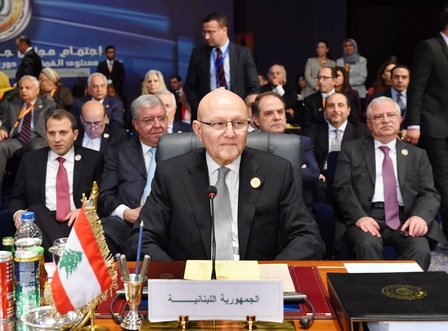
At the Arab summit that was held Saturday at the Red Sea resort of Sharm el-Sheikh , Prime Minister Tammam Salam reiterated Lebanon’s commitment to the dissociation policy and called for distancing Lebanon from the region’s conflicts.
Lebanese rivals adopted in 2012 during a national dialogue session the Baabda Declaration, which calls for Lebanon to distance itself from regional crises, most notably the one in Syria.
But the Iranian backed Hezbollah militant group reneged on the declaration and sent on orders by Iran tens of thousands of its fighters to Syria to help the regime of embattled president Bashar al Assad in its fight against the mostly Sunni rebels .
Salam held several meetings with Arab leaders on the sidelines of the summit, including Egyptian President Abdel Fattah al-Sisi.
Sisi welcomed at the opening session of the Arab Summit the dialogue between the Lebanese rivals, calling for swift election of a new head of state.
For his part, U.N. chief Ban Ki-moon considered that Lebanon is a unique example on averting repercussions imposed by Syria’s war.
“Its is a model for coexistence,” Ban said, calling on” rivals Lebanese political leaders to overcome their political differences and elect a president to fill the leadership vacuum, which has stretched for over a year.”
Salam headed a ministerial delegation compromised of Interior Minister Nouhad al-Mashnouq and Labor Minister Sejaan Qazzi and was joined later by Foreign Minister Gebaran Bassil who was already there to take part in the Arab Foreign Ministers meeting on Thursday.
Foreign ministers gathered in Sharm el-Sheikh ahead of the summit on Thursday and agreed on a broad plan for establishing a joint military force. It came as Saudi Arabia and its allies launched a campaign of air-strikes in Yemen against Iranian-backed Shiite Houthi rebels who have taken over much of the country and forced its U.S.- and Arabian Gulf-backed president Abedrabbo Mansour to flee abroad. But some countries such as Iraq and Syria will not be joining such a military force because they are allied with Iran
The summit was attended by the emirs of Kuwait and Qatar , kings of Jordan , Bahrain and Saudi Arabia , presidents of Djibouti, Iraq ,Palestinian Authority , Somalia, Sudan ,Tunisia , Yemen and the UN chief . Other leaders were represented by their Foreign ministers . Libya was represented by the Speaker its internationally recognized parliament .
The summit is being held under tight security, with extra police and army deployed on the streets of what is normally a tourist resort and with military aircraft patrolling its skies.
Cease fire initiative
Algeria presented to both Saudi Arabia and Egypt an initiative for cease-fire in Yemen, an Algerian diplomat said Saturday.
He added that the initiative consisted of three points, noting that Algeria had only wanted to get approval from both Egypt and Saudi Arabia in order to start convincing Yemen’s Shiite Houthi group to agree to the cease-fire.
The initiative called for the withdrawal of the Houthis from Yemeni capital Sanaa and the return of Yemen’s dissolved parliament, the diplomat said.
He added that the initiative also called for giving security assurances to the Houthis and their allies in Yemen
Saudi Arabia asked, however, for amending the initiative in a way that could open the door for the deployment of Arab troops in Sanaa, the diplomat said.
The summit’s agenda
Al Ahram reported that the summit has following agenda in addition to discussing Yemen
-The agenda of the summit itself and the monitoring of the implementation of its decisions and commitments.
– The Palestinian cause, the Arab-Israeli conflict, Palestinian resistance and the activation of Arab peace initiative.
– Developing the Arab League and amending the Charter of the League.
– Developments in the crisis in Syria, Libya and Yemen.
– Support for Somalia.
– The Iranian occupation in 1971 of three Emirati islands, the Islands of Greater and Lesser Tunb and Abu Musa.
– Arab national security and combating terrorist extremist groups.
– A review of all draft resolutions submitted by the Economic and Social Councils.
– Issuing a declaration of the Sharm El-Sheikh summit.
– Deciding on a host for the next summit.

Leave a Reply
You must be logged in to post a comment.